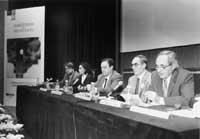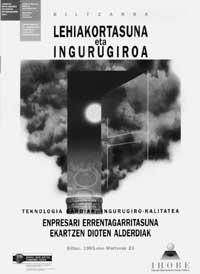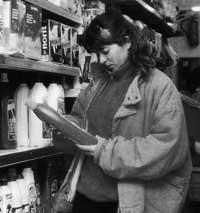The environment, a new aspect of competitiveness
Production without waste generation is not easy. So far, the effort of a few companies has not been the main objective of the industry. However, the demands of the market have changed and with it, although at a lower rate, the productive habits of the industry. Quality versus quantity. In the same way that until recently has been characterized by the search for quality, without discarding it, at present clean production is promoted, an industrial activity that leaves no mark on the environment. The “clean” forms of production are already coming and soon their incorporation into this trend will be essential to be competitive in the future.

Is the Basque company ready to face the challenge?. Moreover, if you do not bet on environmental management, will the Basque company be able to maintain itself? On 23 March, the meeting “Competitiveness and Environment. The Conference analyzed the topic “Clean Technologies and Environmental Quality”.
A more conducive context for the organization of the congress could not be found. In March, the PROMA International Environment Fair was held in Bilbao and many sessions were held on this topic. The Bilbao Exhibition Centre has analyzed the environmental situation in numerous video sessions, conferences, exhibitions and debates, among others. Despite its poor social impact, the daily tool has become a reference centre for environmentalists. After PROMA, clear conclusions were not expected and so it has happened.
Noteworthy is the detailed study of the industry. All the experts gathered in Bilbao agreed to analyze the importance and responsibility of industrial activity in the environment. The industry is undoubtedly one of the most polluting activities carried out by the human being and so has confirmed PROMA.
In this sense, the Public Society of Environmental Management, IHOBE, has organized the conference “Competitiveness and Environment. Congress “Clean Technologies and Environmental Quality”.
There we heard many opinions about the new challenge facing the industry. Speakers from Germany or the USA informed us about the models and situation of their territories. They also talked a lot about what was done in Euskal Herria. Also what is pending.
On the need to collaborate on the road
The Department of Spatial Planning, Housing and Environment of the Basque Government announced in Bilbao its intentions in this area. According to Environment Deputy Minister Esther Larrañaga, “our goal is to produce without waste. When we made possible the Special Waste Management Plan, we proceeded to develop the necessary tools to achieve this goal. In any case, we do not stay on that path and the Comprehensive Plan of Technologies and Productive Processes ERAIKIZ is already underway.”
Deadlines cannot be fixed, but future achievements cannot be missed. By the year 2000, a 25% reduction in waste generation is expected by the Basque industry and proper management, knowing the characteristics of the waste set. Achieving these goals will not be easy, but Esther Larrañaga wanted to make it clear that the path continues to be taken step by step. During his speech he stressed that “prevention policy is carried out through minimization technologies and the replacement of raw materials is the last step of the ladder. The rest of the previous steps will have to be taken as the correct waste management will start from here. Consequently, it is a step that has and will have absolute priority.”

In order to ensure that the aforementioned objective was not at all, it was demonstrated that environmental management could have access to companies. Moving the model of the countries that have established environmental policy, the Basque Government decided to create a Technical Office for the XUME or Xumetzería and join the IHOBE Public Society. In essence, four are the main lines of action of the organization: analyze the ecological and economic viability of new technologies, conduct audits and coordinate them, promote clean technologies through demonstration projects and R&D projects and lay the foundations of preventive policy.
On a daily basis, XM has a direct relationship with industry and research centres. Thanks to this, he has known in detail the needs of the company and the latest technologies. Only two years have passed since the creation of the Office of Minimization and the results of its work are already known. The clearest example is the Urdaibai Industrial Waste Management and Minimization Plan.
Adapting to the general trend
Basque companies are aware of the importance of being competitive. When you talk about a single market, you talk about a market that limits itself, prioritizing quality. Clean production without waste generation has become a law in which the environmental variable must be placed. Failure to consider the new trend of production would lead to the short-term closing of the doors of the big market, as has already been confirmed in some specific cases. In fact, before foreign investors acquire something or establish business relationships, they take into account the state of the company's environmental management and make decisions based on this factor.
At the Bilbao session we learned about the decisions of the company IBERDROLA regarding environmental management. The main intention of IBERDROLA is that its suppliers join the environmental commitment. The objective of IBERDROLA is to achieve a total quality that depends largely on its suppliers. In addition to ensuring compliance with environmental standards approved by the European Community, IBERDROLA offers courses and training programs to 150 suppliers. The aim is to update the production process, take advantage of clean technology and properly manage waste.
Consumer and environmental concern
Of course, it is not done from morning to night. The industry needs tools to produce clean. In addition to subsidy and advice, the industry needs public recognition of its effort. In addition to the institutions, the market will have to capture the impact of the work done. The relationship between industry and consumer has always been measured according to demand/supply law. Once again, the market must bet on environmental management. In this sense, what is the attitude of the Basque consumer?

As we learned at the Bilbao Conference, the Basque consumer has been aware and pessimistic about the situation. The EROSKI group has turned to 1,700 consumers for their environmental concerns. The survey was conducted in the Autonomous Community of the Basque Country and in Navarra, and we learned about the work done in Bilbao. According to the survey, 90% of the population considers that the environment is bad or very bad and in the short term is in favor of taking action. As for the attitude of consumers, there is no doubt that we support an active participation that has allowed us to confirm in concrete experiences such as glass recycling and selective collection. In addition, the Basque consumer assumes the environmental problem. Most, 70%, were willing to accept individual responsibility.
Plan ERAIKIZ, promoting clean behavior
The Department of Spatial Planning, Housing and Environment of the Basque Government presented “ERAIKIZ. Clean Products and Technology Action Plan.” Antton Azkona, Technical Director of IHOBE, presented the Project, since the Public Society was in charge of elaborating what in the future will be the “guide book” of the industry.
The philosophy of the ERAIKIZ Plan is based on the principles established by the European Association for Environmental Management. All the most important is the commitment to sustainable development. This means that the responsibility for any human or industrial activity with its surroundings is its duration. To do this, we must begin to pay off our debt to future generations.
The development model must adapt to this philosophy and since the Rio de Janeiro Summit is called Sustainable Development. In addition to philosophy, the Environmental Challenge is an obligation of many States. In the discussion session of the GATT agreements, it was approved that the environmental agreements adopted in the International Forums correspond to all States and should comply with them. Also, in the Maastricht Act of Constitution, the European Association says: “The main objective of the Association will be to promote a balanced development of economic activities, promoting sustainable growth and environmentally friendly production models.”
They are all written. From its beginnings and to start working, standards or laws are needed and so far there has been a vacuum in the Basque Autonomous Community.
The first step of the ERAIKIZ Plan was to set priorities. The minimization policy was based on the classification of waste. According to the Special Industrial Waste Management Plan, there are 80 streams or types of waste comparable to industrial sectors or processes. Classification priorities were established: first, large quantitative waste streams were adopted and control measures were developed on the activities they generate. On the other hand, it is intended to have a great impact on the industry, especially in small and medium enterprises. The measures taken will have a strategic value, that is, it is considered that they will contribute to creating a climate favorable to the minimization of waste in the companies of the environment.

The second step consolidated the area of influence of the ERAIKIZ Plan. Where and how should the measures be guided? After analyzing the main trends worldwide, geographic, sectoral and process areas have been consolidated.
As mentioned above, the ERAIKIZ Plan responds to the environmental policy of the European Association. Needs are similar. On the one hand, we must fill the legal vacuum and on the other, look for a way to channel financial aid. The ERAIKIZ Plan has followed the same path as the European Union, with the aim of rewarding industrial activities that are not limited to law enforcement.
The master lines of the ERAIKIZ Plan were presented at the Bilbao Day. On the contrary, the project will still have to go a long way to read the provisional text in 1997. As set out in the Plan schedule, this year's work will be to set priorities. Both sectors and processes will be defined in 1996. During the execution of these works new tools of minimization will be worked: systems of access to technologies, laws or standards, economic incentives, training campaigns, etc. Before the end of the journey, in-depth discussions will be held between all the entities and working groups that have participated in the ERAIKIZ Plan, so that the final text will have the consensus of all or most participants.





